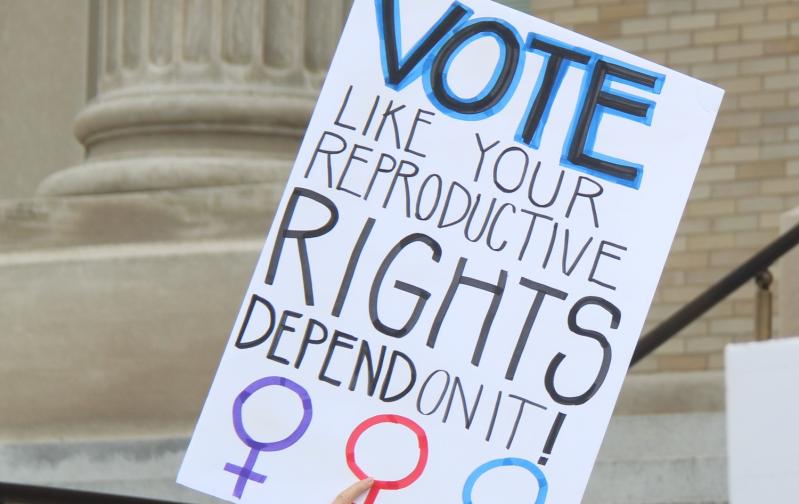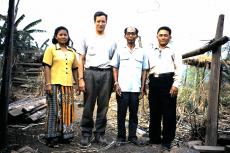On Friday, the United States, the world's richest and most powerful democracy, joined one of the poorest countries in the continental Americas (Nicaragua), the smallest country in Central America (El Salvador), and an ultranationalist Poland to become only the fourth country in the Western world where abortion care is widely banned.
President Biden issued a statement the same day, blasting the Supreme Court's ruling, in which states can now set their own abortion laws, for "taking America back 150 years" and making it "an outlier among developed nations in the world."
For Republicans, it was a victory. Donald Trump told Fox News that "God made the decision," while Congressman Lee Zeldin of New York's First Congressional District and the Republican Party's nominee for governor, said in a statement, "Today is a victory for life, for family, for the constitution, and for federalism. . . . In a state that has legalized late-term partial birth abortion and non-doctors performing abortion, in a state that refuses to advance informed consent and parental consent, and where not enough is being done to promote adoption and support mothers, today is yet another reminder that New York clearly needs to do a much better job to promote, respect and defend life."
Although the ruling was largely expected after a draft opinion leak last month, it was nevertheless stunning and the aftershock reverberated around the world. The United Kingdom's Boris Johnson called the court's decision "a big step backwards." Justin Trudeau of Canada condemned it as "horrific" and added that "no government, politician, or man should force a woman to carry out a pregnancy." French President Emmanuel Macron tweeted: "Abortion is a fundamental right for all women. It must be protected." United Nations Secretary General spokesperson Stephane Dujarric pointed out that, "restricting access to abortion does not prevent people from seeking abortion; it only makes it more deadly." In Mexico, where the Supreme Court decriminalized abortion last September, activists are promising to send abortion-inducing pills across the border and to help Americans access clinics in Mexico. On Facebook, the Danish prime minister wrote, "My heart cries for girls and women in the United States."
But, what now?
"Well, I think that's the question that everybody is asking," said Rebecca Dolber, a founder of the East End Action Network, who recently helped stage a protest rally on the steps of the Suffolk County Supreme Court in Riverhead. "And as far as I'm concerned, the thing that we need to do is exactly what we've always had to do, which is to show up, go into the street to say this is not okay, and you have to vote. And you have to take someone with you to vote," she said over a phone call.
Ms. Dolber also cautioned New Yorkers to not feel complacent simply because they live in one of 20 states (and the District of Columbia), with laws that protect abortion rights.
"It's a dangerous thing for us to think we're in a bubble in New York so it won't affect us. What affects women elsewhere affects women here. We're all connected. So, you should care. And with what happened yesterday with the Supreme Court and gun laws . . . " she said, trailing off, referring to 24 hours earlier when the country's highest court struck down a New York State limit on carrying concealed handguns in public. "No one is safe," she said.
Progressive states such as New York have already mobilized to become abortion safe havens. Because of this, Ms. Dolber encouraged people to donate to organizations like Planned Parenthood that have been readying themselves to treat an increased number of women from states where abortions are banned.
"Donating to your local abortion fund ensures that a person seeking abortion in a state where it's illegal, can call someone who can help them plan and fund their trip. You're making sure someone receives them at their destination, with compassion and open arms, with information and support, and gets them back home safe," she said.
Dr. Meera Shah, the chief medical officer and director of gender affirming care at Planned Parenthood Hudson Peconic, exists on the front lines of the battle over reproductive rights. In an email to The Star, Dr. Shah wrote: "Today's decision is no less than a travesty. Any person who believes in and values a person's inherent right to control their own bodies, their lives, and their futures recognizes this decision for what it is: a disgrace to our society, to our health care system, and most importantly, to patients."
"The ruling today will have a devastating impact on our society for generations to come. As a doctor, as an abortion provider, I know firsthand what this will do to the millions of people of reproductive age in this country. It will set them back. It will cause hardship. It will increase poor health outcomes. I will continue to speak up, speak out, and fight for change."
Indeed, Friday's decision is expected to disproportionately harm poor people and women of color. America is already a difficult place to be pregnant, with the highest maternal mortality rate by far of any developed country, largely due to the multifaceted inequalities of poverty, health care, and education. For every 100,000 U.S. births, 23.8 women died from pregnancy or childbirth-related causes in 2020, according to the U.S. Centers for Disease Control and Prevention. Now, a study conducted by Amanda Jean Stevenson, an assistant professor of sociology at the University of Colorado Boulder, showed that a nationwide ban on abortions would result in a 21-percent increase in pregnancy-related mortality across the country, with a 33 percent rise among women of color, who are less likely to have the means to pay for travel to another state.
Activists who work in minority communities, like Sandra Dunn, the assistant director of Organizacion Latino-Americana of Eastern Long Island, fear the socioeconomic effects of the new abortion law. In a message to the East End she underscored the expected impacts on low-income women and families of color, "who historically have less access to reproductive health services, including safe, effective, preventive methods of birth control. OLA believes that this decision endangers the lives of women and erodes women's constitutional right to privacy, a fundamental component of the Roe v. Wade decision."
Jenifer Van Deinse, the regional director of philanthropy at Planned Parenthood Hudson Peconic, told The Star, "Black women are more than four times more likely to die during a pregnancy and childbirth than white women. And we know that abortion bans disproportionately harm Black, Latino, Indigenous, and other people of color because of this country's legacy of racism and discrimination."
In addition, by abruptly scrapping the constitutional right to terminate a pregnancy, the Supreme Court went against the popular will -- a recent Gallup poll showed that 55 percent of Americans believe that abortion should be legal. Several historians and institutions have called this an assault on women and the pillars of democracy.
In advance of yesterday's protest rally in Riverhead, Suffolk County Legislator Bridget Fleming, who is running for the Democratic nomination for Congress in the First District, told The Star, "The Supreme Court ruling overturning Roe and Casey delivers a gut punch to tens of millions of Americans. I commit to stand with all women against this travesty. And let's not lose sight of what Justice Thomas's opinion makes clear. They're coming after many more fundamental human rights next. A free nation is measured by the rights enjoyed by its citizens; totalitarian governments are measured by the rights ripped away. . . . We are better than this."




